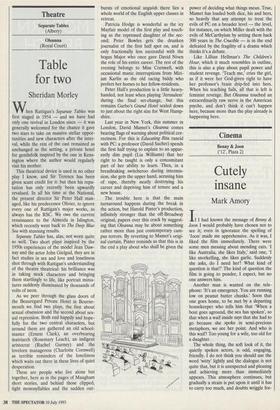Theatre
Separate Tables (Albery) Oleanna (Royal Court)
Table for two
Sheridan Morley
When Rattigan's Separate Tables was first staged in 1954 — and we have had only one revival in London since — it was generally welcomed for the chance it gave two stars to take on massive stellar oppor- tunities and new characters after the inter- val, while the rest of the cast remained as unchanged as the setting, a private hotel for gentlefolk inspired by the one in Kens- ington where the author would regularly visit his mother.
This theatrical device is used in no other play I know, and Sir Terence has been given scant credit for it: but then his repu- tation has only recently been upwardly revalued. In all his time at the National, the present director Sir Peter Hall man- aged, like his predecessor Olivier, to ignore every one of Rattigan's major works, as always has the RSC. We owe the current renaissance to the Almeida in Islington, which recently went back to The Deep Blue Sea with stunning results.
Separate Tables has, alas, not worn quite so well. Two short plays inspired by the 1950s experiences of the model Jean Daw- nay and the actor John Gielgud, they are in fact studies in sex and love and loneliness shot through with Rattigan's understanding of the theatre theatrical: his brilliance was in taking stock characters and bringing them startlingly to life, like portrait minia- tures suddenly illuminated by thousands of volts of neon.
As we peer through the glass doors of the Beauregard Private Hotel in Bourne- mouth we find two plays, the first about sexual obsession and the second about sex- ual repression. Both end happily and hope- fully for the two central characters, but around them are gathered an old school- master (Ernest Clark), an overbearing matriarch (Rosemary Leach), an indigent aristocrat (Rachel Gurney) and the lovelorn manageress (Charlotte Cornwell) as terrible reminders of the loneliness which waits out there in these lives of quiet desperation.
These are people who live alone but together, here as in the pages of Maugham short stories, and behind those clipped, tight monosyllables and the sudden out-
bursts of emotional anguish there lies a whole world of the English upper classes in retreat.
Patricia Hodge is wonderful as the icy Mayfair model of the first play and touch- ing as the repressed daughter of the sec- ond; Peter Bowles gets the drunken journalist of the first half spot on, and is only fractionally less successful with the bogus Major who once gave David Niven the role of his entire career. The rest of the evening belongs to Miss Cornwell, with occasional manic interruptions from Miri- am Karlin as the old racing biddy who prefers her horses to her fellow-residents.
Peter Hall's production is a little heavy- handed, not least when playing 'Jerusalem' during the final set-change, but this remains Garbo's Grand Hotel scaled down to just about the right size for West Hamp- shire.
Last year in New York, this summer in London, David Mamet's Oleanna comes bearing flags of warning about political cor- rectness. For this is Educating Rita rancid with PC: a professor (David Suchet) spends the first half trying to explain to an appar- ently dim pupil (Lia Williams) that her right to be taught is only a concomitant part of her ability to learn. Then, in a breathtaking switcheroo during intermis- sion, she gets the upper hand, accusing him of rape, thereby neatly destroying his career and depriving him of tenure and a new house.
The trouble here is that the main turnaround happens during the break in the action, but Harold Pinter's production, infinitely stronger than the off-Broadway original, papers over this crack by suggest- ing that Oleanna may be about something rather more than just contemporary cam- pus terrors. By reverting to Mamet's origi- nal curtain, Pinter reminds us that this is in the end a play about who shall be given the power of deciding what things mean. True, Mamet has loaded both dice, his and hers, so heavily that any attempt to treat the evils of PC on a broader level — the level, for instance, on which Miller dealt with the evils of McCarthyism by setting them back 300 years in The Crucible — is in the end defeated by the fragility of a drama which thinks it's a debate.
Like Lillian Hellman's The Children's Hour, which it much resembles in outline, this is also a play about pupil power and student revenge. 'Teach me,' cries the girl, as if it were her God-given right to have her professor's brain drip-fed into hers. When his teaching fails, all that is left is feminist revenge. But Oleanna touched an extraordinarily raw nerve in the American psyche, and don't think it can't happen here, because more than the play already is happening here.


















































 Previous page
Previous page